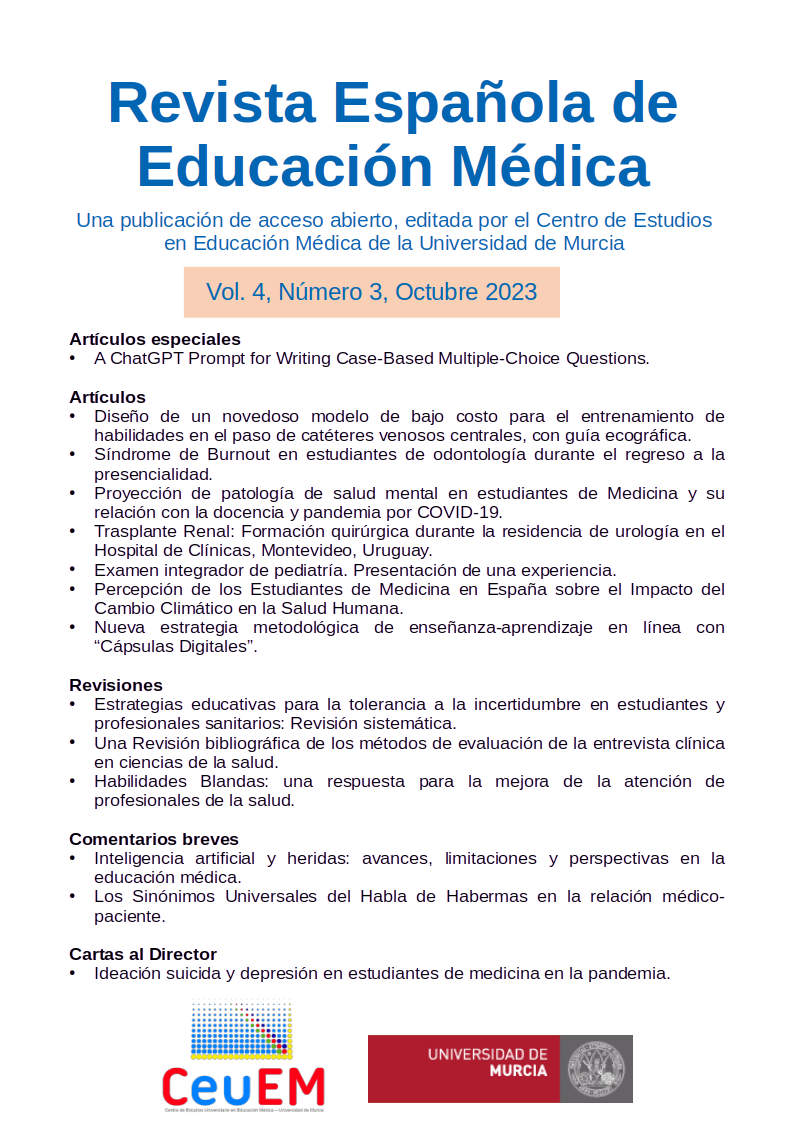Trasplante Renal: Formación quirúrgica durante la residencia de urología en el Hospital de Clínicas , Montevideo Uruguay
Abstract
Objective: To describe the surgical activity corresponding to the recipient’s surgery made by an urology resident during the kidney transplant rotation at Hospital de Clínicas, Montevideo Uruguay, from April 2023 to July 2023.
Materials and methods: A descriptive study was carried out. The main variables of interest are number of surgeries performed, type of ureteral reimplantation, and surgery time. The data were collected from the record made in the institution's surgery descriptions program and analyzed in Excel version 2019.
Results: In a four-month period, the resident performed a total of 16 recipient surgeries. Only two ureteral reimplantation surgical techniques were performed; Lich-Gregoir and Taguchi. In all the interventions, the resident had the role of surgeon. In 25% (n=4) of the interventions the Lich-Gregoir technique was performed and in 75% (n=12) the Taguchi technique. The average surgery time was 95.12 minutes with a standard deviation of 23.42 minutes in general.
Conclusion: Rotation for kidney transplantation during the training of urology residents in Uruguay allows them to acquire surgical skills, not only applicable in kidney transplant surgery. During rotation for kidney transplantation, urology residents in Uruguay manage to perform 10% of the ureteral implants suggested by the Spanish Association of Urology (AEU) for their training. The multidisciplinary management of patients in conjunction with vascular surgery and nephrology is essential in resident training.
Downloads
-
Abstract380
-
pdf212
References
(1) End Stage Renal Disease: Chapter 6 [Internet]. U.S. Department of Health and Human Services; [cited 2023 Aug 6]. Available from: https://usrds-adr.niddk.nih.gov/2022/end-stage-renal-disease/6-mortality
(2) Montañés Medina P. El Trasplante Renal pionero y motor de los Trasplante de órganos. Actas Urológicas Españolas. 2010 Dec;34(10). doi:10.4321/s0210-48062010001000001
(3) J. WA. Urología de Campbell-Walsh: 10A EDICIÓN. México, D.F.: Médica Panamericana; 2015. (Trasplante Renal; vol. 2).
(4) Rodriguez-Juanicó L, Pereyra Bonasso J, Gonzalez F, Orihuela S, Curi L, Balboa Ó, et al. Registro uruguayo de trasplante renal. 1989 . Montevideo: Revista Médica del Uruguay; 1990.
(5) Puente Cordano. Programa de formación de especialistas en urología. Montevideo: UdelaR. Facultad de Medicina. Escuela de graduados.; 2017.
(6) Preliminary report newsletter transplant International figures on donation and transplantation 2022. . Montevideo: Instituto Nacional de Donación y Trasplante de Células, Tejidos y Órganos (INDT; 2022.
(7) Riverós A, Claro A. Evaluation of surgical training at the end of the urology postgraduate course at the hospital de clínicas in Montevideo, Uruguay. Revista Española de Educación Médica. 2023;4(2). doi:10.6018/edumed.568211
(8) Cabello-Benavente R, González-Enguita C. Residencia de Urología y Formación en Trasplante Renal: Resultados de una encuesta a Nivel Nacional. Actas Urológicas Españolas. 2015 Jun;39(5):303–9. doi:10.1016/j.acuro.2014.09.002
(9) Cienfuegos-Belmonte IR, León-Dueñas E, Román-Martín AA, Olmo-Ruíz M, González-Roncero FM, Medina-López RA. Evaluación de los indicadores de Calidad Asistencial de la Asociación Española de Urología en un programa de trasplante renal. Actas Urológicas Españolas. 2016 Oct;40(8):523–8. doi:10.1016/j.acuro.2016.02.003
(10) Castañeda-Millán D, Alzate-Granados JP, Tobar-Roa V, García-Perdomo H, Autrán-Gómez AM, Donoso-Donoso W. Trasplante renal en el entrenamiento urológico Colombiano. Archivos Españoles de Urología; 2021.
Copyright (c) 2023 Servicio de Publicaciones de la Universidad de Murcia

This work is licensed under a Creative Commons Attribution-NonCommercial-NoDerivatives 4.0 International License.
The works published in this magazine are subject to the following terms:
1. The Publications Service of the University of Murcia (the publisher) preserves the economic rights (copyright) of the published works and favors and allows them to be reused under the use license indicated in point 2.
2. The works are published under a Creative Commons Attribution-NonCommercial-NoDerivative 4.0 license.
3. Self-archiving conditions. Authors are allowed and encouraged to disseminate electronically the pre-print versions (version before being evaluated and sent to the journal) and / or post-print (version evaluated and accepted for publication) of their works before publication , since it favors its circulation and earlier diffusion and with it a possible increase in its citation and reach among the academic community.



















